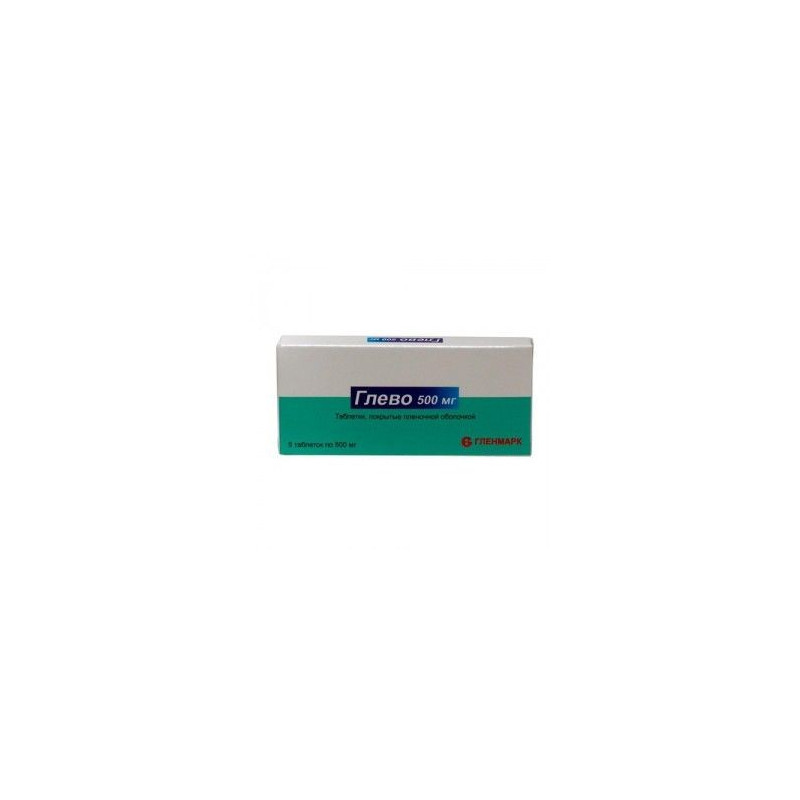



 All payments are encrypted via SSL
All payments are encrypted via SSL
 Full Refund if you haven't received your order
Full Refund if you haven't received your order
Film Coated Tablets
1 pill contains Levofloxacin (in the form of hemihydrate) 500 mg
5 pieces.
Glevo - an antibacterial drug of the fluoroquinolone group of a broad spectrum of action Levofloxacin blocks DNA gyrase (topoisomerase II) and topoisomerase IV, disrupts supercoiling and stitching of DNA breaks, suppresses DNA synthesis, causes profound morphological changes in the cytoplasm, cell wall and membranes of microorganisms.
- Infectious and inflammatory diseases caused by susceptible microorganisms
- Infections of upper respiratory tract (including acute sinusitis).
- Infections of the lower respiratory tract (including exacerbation of chronic bronchitis, community-acquired pneumonia).
- Uncomplicated and complicated infections of the urinary tract and kidneys (including acute pyelonephritis, prostatitis).
- Genital infections.
- Infections of the skin and soft tissues (suppurative atheroma, abscess, furunculosis).
- Infections of the abdominal cavity (in combination with drugs acting on anaerobic microflora).
- Epilepsy.
- The defeat of the tendons in the previously conducted treatment with quinolones.
- Pregnancy.
- Lactation period (breastfeeding).
- Children and adolescence (up to 18 years).
- Hypersensitivity to levofloxacin and other fluoroquinolones.
The drug should be prescribed with caution to elderly patients (due to the high probability of the presence of a concomitant reduction in renal function), with a deficiency of glucose-6-phosphate dehydrogenase.
It is taken orally, 1 or 2 times a day. The average dose of 250 or 500 mg per day.
On the part of the digestive system: nausea, vomiting, diarrhea (including blood), indigestion, loss of appetite, abdominal pain, pseudomembranous enterocolitis, increased activity of hepatic transaminases, hyperbilirubinemia, hepatitis, dysbacteriosis.
On the part of the cardiovascular system: reduction in blood pressure, vascular collapse, tachycardia, prolongation of the QT interval; extremely rarely - atrial fibrillation.
On the part of the endocrine system: hypoglycemia (increased appetite, increased sweating, tremors, nervousness).
On the part of the central nervous system and peripheral nervous system: headache, dizziness, weakness, drowsiness, insomnia, tremor, anxiety, paresthesia, fear, hallucinations, confusion, depression, movement disorders, epileptic seizures (in susceptible patients).
From the senses: visual impairment, hearing, smell, taste and tactile sensitivity.
Perhaps a decrease in cerebral seizure threshold with the combined use of levofloxacin with non-narcotic analgesics and theophylline.
With the combined use of the drug Glevo with cimetidine and probenecid an increase in the half-life of levofloxacin is observed. Special care should be exercised when prescribing the combined use of these drugs to patients with reduced kidney function.
Levofloxacin with simultaneous use increases the half-life of cyclosporine.
Caution should be exercised when prescribing Glevo at the same time as vitamin K antagonists. If Warfarin and other vitamin K antagonists are to be prescribed, it is recommended that coagulation rates be monitored simultaneously with levofloxacin.
The use of high doses of levofloxacin can lead to the development of dizziness, nausea, ulcerative erosive lesions of the mucous membranes of the digestive tract, convulsive seizures and impairment of consciousness. With further increase in the dose of levofloxacin in patients, the Q-T interval is lengthened.
There is no specific antidote. In case of overdose, symptomatic therapy and measures aimed at maintaining the function of the cardiovascular system are recommended. Treatment of overdose should be carried out in a hospital, it is recommended to monitor the ECG.
With levofloxacin intoxication, hemodialysis is ineffective.
If, after oral administration of high doses of levofloxacin, no more than 60 minutes have passed, gastric lavage is performed and enterosorbents are prescribed.
The drug should be stored out of reach of children at a temperature not exceeding 25 ° C.
